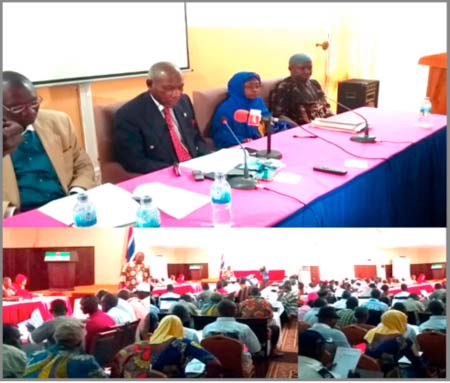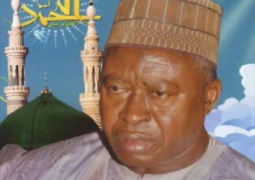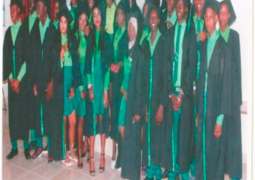
The
Independent Electoral Commission (IEC) yesterday welcomed and briefed local and
international election observers in respect of the upcoming December 1
election.
The
IEC chairman, Alieu Momarr Njie, said the IEC since its inception in 1997 had
conducted three presidential elections, three national assembly elections and
three local government elections, as well as several by-elections for the
national assembly and local government.
The
Gambia’s Independent Electoral Commission was established under chapter 5,
section 42 of the Constitution of the Republic of The Gambia.
It
is mandated under the constitution and electoral laws with the registration of
political parties, the conduct and supervision of the registration of voters
for all public elections and referenda, and announces the results of all
elections and referenda for which it is responsible.
There
are 886,578 registered voters and 1,422 polling stations for the fourth
presidential election, slated for Thursday 1 December 2016, he added.
The
Banjul Administrative Area registered 22,731 voters with 35 polling stations,
Kanifing Administrative Area registered 199,957 voters with 287 polling
stations, Brikama Administrative Area registered 281,115 voters with 427
polling stations, Kerewan Administrative Area registered 101,717 voters with
183 polling stations, Mansakonko Administrative Area registered 49,198 voters
with 90 polling stations, Janjanbureh Administrative Area registered 116,675
voters with 207 polling stations and Basse Administrative Area registered
115,185 voters with 193 polling stations
Five
thousand four hundred and sixty-two polling staff will be contracted to manage
these polling stations.
One
hundred and twenty-two assistant returning officers have been hired to work in
the 53 constituencies countrywide, and there are seven collation centers, while
counting will be done at the polling stations at the close of polls.
He
said polls will be opened at 8am and close at 5pm.
Mr
Njie further stated that no one could rig the election, as the electoral system
is second to none in terms of its transparency, credibility, fairness and
accuracy.
“Come
Thursday 1 December, during your visits to the various polling stations, you
will see for yourself countrywide that our voting system is fool-proof, tamper-proof
and rig-proof.”
He
entreated donor agencies to make significant contributions towards the costs
associated with temporarily hired electoral staff, party agents and other
related costs towards the forthcoming elections.
He
registered his profound gratitude to the UNDP for their invaluable and tangible
support.
The
Inspector General of Police, Yankuba Sonko, in his remarks, said although
elections in Africa are sometimes marred by violence and insecurity, they are
hopeful that of The Gambia would be a peaceful one.
He
called on the general public to jealously safeguard the existing peace and
security, and remain vigilant to report any suspicious or clandestine activity
to the police or members of the security agencies, for redress.
‘’While
the genuine individuals within the country engage themselves in decent and
peaceful politics, some unscrupulous individuals may want to take advantage of
the situation to cause violence and other forms of crime.
‘’Minor
incidences have occurred during some campaigns in few regions, but were
effectively managed by the police and stakeholders.”
These
incidences included the assault on the village head of Basori and entourage by
stoning in West Coast Region, assault on two APRC militants at Abuko and Cow
Junction in Kanifing Region, the tampering with APRC flag and assault on one
APRC militant, alleged attempt to remove the portrait of the incumbent
president in Ndowen in CRR, and stoning of APRC party members in their meetings
at Dampha Kunda and Tamba Sansang, both in URR.
All
these reported incidences were perpetrated against the APRC party by members of
the opposition, he added.
“In
spite of these minor hitches, we are particularly confident that the
forthcoming presidential election would be conducted in an atmosphere of peace
and security.”
IGP
Sonko reassured the observers and the general public that there is already
adequate security countrywide for the election, as they have beefed up security
at all regions, including the key installations and for VIPs, at the various
polling stations and for all political heads.
He
hailed the unprecedented level of collaboration among the stakeholder
institutions such as the IEC, the police, National Security Council, civil
society organisations, and the political parties on election matters, who have
all been advocating for peace and security during the electoral process.



